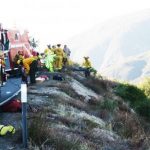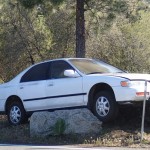Proposition 11 is essentially a labor dispute between American Medical Response and other private ambulance companies, and their emergency medical technician and paramedic staff.
Currently, during a shift, staff is supposed to find time for a 30-minute lunch break and a 10-minute rest break every four hours, according to California labor laws. Ambulance crews are officially on-call during these breaks.
However, in 2016, the California Supreme Court ruled “on-call breaks violate state labor law,” according to the Legislative Analysts Office. However, the case, Augustus v. ABM Security Services involved a security firm. AMR employees had filed similar litigation. And most observers would expect the Supreme Court to side with the AMR employees.
Not only would the ambulance companies have to provide paid lunch and rest breaks, but might have to move other crews into locations to cover potential emergency calls during these break periods. Both would increase the companies’ costs.
Since the 2016 decision, AMR has tried to secure legislation to maintain the on-call breaks, but that effort failed in 2017. Consequently, AMR has sponsored a proposition to settle its labor dispute.
First, voters should know that Prop 11 only applies to private ambulance companies in California, which provide about 75 percent of ambulance transports in the state. Public ambulance service, from local fire departments such as the Idyllwild Fire Protection District, is not affected by Prop 11.
If approved, the proposition would allow the private ambulance companies to continue the practice of providing on-call breaks. But the breaks may not be in the first or last hour, and companies must have enough ambulances to meet meal-break schedules.
It also would require ambulance companies to offer EMTs and paramedics the following: 1) annual natural disaster, active shooter and violence prevention training; 2) mental health and wellness education; 3) mental health counseling sessions; and 4) access to long-term mental health services.
And, many interpret that the Supreme Court’s “Augustus” decision could result in companies owing employees compensation for the past unpaid breaks and there is litigation against AMR for these claims. Prop 11 states “the past industry practice of on-call meal and rest breaks was allowable,” which could absolve ambulance companies from paying these costs.
If Prop 11 is disapproved, private ambulance company crews would likely have the same rights to paid breaks as Augustus v. ABM Security Services grants security-firm employees. This could affect county governments throughout the state.
The passage of Prop 11 would save private ambulance companies about $100 million annually, according to the LAO. If these costs are not avoided, these companies will seek to lower their payments to counties for the ambulance contracts or seek to raise fees for transports. Since Medicare and Medicaid limit the amount of their reimbursement for ambulance transports, AMR and others already lose money transporting these patients. Consequently, patients with private insurance are charged more. These costs will increase to compensate for the added cost of paid breaks, according to the information in the Voters Guide.
Through Sept. 22, AMR had contributed $21.9 million in support of Prop 11 and the committee still had $9 million available to spend in support for the proposition. AMR gave another $4 million on Oct. 15.
The opposition, although it has not formed a financial committee, is composed of the California Democratic Party, California Labor Federation, SEIU California, the United Steelworkers United EMS Workers, AFSCME Local 4911 and AFSCME California.
In their press release, they argue, “Prop 11 is a wolf in sheep’s clothing. While purporting to be about protecting public safety, this initiative is simply about changing the labor code to protect one private company, American Medical Response, from civil litigation for alleged violations of California law.”










